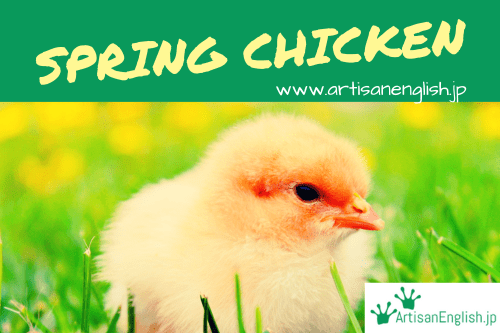
YouTube / iTunes / Spotify / Radio Public / Pocket Casts / Google Podcasts / Breaker / Overcast
Listen to ArtisanEnglish.jp posts & lesson intros here.
WotD: Spring chicken
Isn’t this little chick cute?
This, ladies and gentlemen, is a spring chicken, our new Word of the Day.
As you can see, a chick is very young.
In English, we use the term spring chicken to refer to a young person.
It’s usually used in the negative to indicate that a person is not young anymore.
For example, I’m not a spring chicken anymore, yet I can still dash up the steps to the Entrance gate of Wakayama Castle. (maybe)
Most of the Western world is going through an aging crisis at present, and Japan is leading the pack.
I guess we could say that spring chickens are becoming hard to find. Japan’s population has the world’s highest percentage of retirees and is only getting older.
I shouldn’t call them retirees.
Retirement has the image of sitting back and relaxing after a life of work, but the Japanese don’t ‘do retirement’ very well.
In Japan, after retirement, it’s quite common for a person, even though they are not a spring chicken anymore, to continue working at another job.
The Japanese are also very healthy people.
Even though most can say they are not spring chickens anymore, they are still very active and energetic.
This little community where I live is quite busy early in the morning before it gets too hot.
My neighbours are almost all 70 years old or older and still work in their vegetable gardens early every morning.
We should all take a note from elderly Japanese.
As we age, even though we are not spring chickens anymore, we can remain active and contribute to society.
Of course, older people may be a little slower, but isn’t a slow life something many would like?
Flesch-Kincaid Readability Test
This post is understandable by someone with at least an 8th-grade education (age 13 – 14).
On the Flesch-Kincaid reading-ease test, this post scores 69.
The easier a passage is to read, the higher the score on a scale of 0 – 100.

